17 start with L start with L
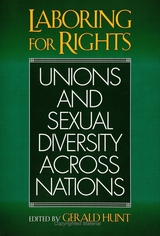
The chapters included in Laboring for Rights give a global vision to the increasingly important subject of equity in the workplace. They offer a much-needed look at labor's involvement with current international workplace conditions from such diverse countries as the United States, Canada, Australia, Germany, Britain, France, the Netherlands, and South Africa, as well as parts of the South Pacific. Some of these countries have strong and progressive labor unions; some, like the U.S., have relatively weak labor organizations. But whatever the context, as these articles demonstrate, there seems to be a growing and in some instances prospering gay/lesbian labor alliance in many parts of the world.
Laboring for Rights is a pioneering text in an important new area of labor study. It will engage readers interested in equality in the workplace, labor and organizational studies, gay and lesbian activism, and international, comparative studies.
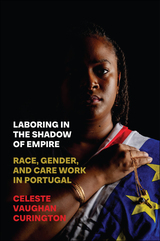
Laboring in the Shadow of Empire: Race, Gender and Care Work in Portugal examines the everyday lives of an African descendant care service workforce that labors in an ostensibly “anti-racial” Europe and against the backdrop of the Portuguese colonial empire. While much of the literature on global care work has focused on Asian and Latine migrant care workers, there is comparatively less research that explicitly examines African care workers and their migration histories to Europe. Sociologist Celeste V. Curington focuses on Portugal—a European setting with comparatively liberal policies around family settlement and naturalization for migrants. In this setting, rapid urbanization in the late twentieth century, along with a national push to reconcile work and family, have shaped the growth of paid home care and cleaning service industries. Many researchers focus on informal work settings where immigrant rights are restricted, and many workers are undocumented or without permanent residence status. Curington instead examined workers who have accessed citizenship or permanent residence status and also explores African women’s experiences laboring in care and service industries in the formal market, revealing how deeply colonial and intersectional logics of a racialized and international division of reproductive labor in Portugal render these women “hyper-invisible” and “hyper-visible” as “appropriate” workers in Lisbon.
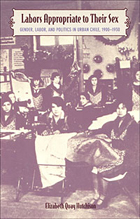
In addition to population and industrial censuses, Hutchison culls published and archival sources to illuminate such misconceptions and to reveal how women’s paid labor became a locus of anxiety for a society confronting social problems—both real and imagined—that were linked to industrialization and modernization. The limited options of working women were viewed by politicians, elite women, industrialists, and labor organizers as indicative of a society in crisis, she claims, yet their struggles were also viewed as the potential springboard for reform. Labors Appropriate to Their Sex thus demonstrates how changing norms concerning gender and work were central factors in conditioning the behavior of both male and female workers, relations between capital and labor, and political change and reform in Chile.
This study will be rewarding for those whose interests lie in labor, gender, or Latin American studies; as well as for those concerned with the histories of early feminism, working-class women, and sexual discrimination in Latin America.
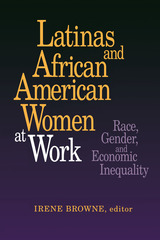


In The Lavender Scare, David K. Johnson tells the frightening story of how, during the Cold War, homosexuals were considered as dangerous a threat to national security as Communists. Charges that the Roosevelt and Truman administrations were havens for homosexuals proved a potent political weapon, sparking a “Lavender Scare” more vehement and long-lasting than Joseph McCarthy’s Red Scare. Drawing on declassified documents, years of research in the records of the National Archives and the FBI, and interviews with former civil servants, Johnson recreates the vibrant gay subculture that flourished in midcentury Washington and takes us inside the security interrogation rooms where anti-homosexual purges ruined the lives and careers of thousands of Americans. This enlarged edition of Johnson’s classic work of history—the winner of numerous awards and the basis for an acclaimed documentary broadcast on PBS—features a new epilogue, bringing the still-relevant story into the twenty-first century.

Numerous labor regulations that were introduced or reformed in Latin America in the past thirty years have had important economic consequences. Nobel Prize-winning economist James J. Heckman and Carmen Pagés document the behavior of firms attempting to stay in business and be competitive while facing the high costs of complying with these labor laws. They challenge the prevailing view that labor market regulations affect only the distribution of labor incomes and have little or no impact on efficiency or the performance of labor markets. Using new micro-evidence, this volume shows that labor regulations reduce labor market turnover rates and flexibility, promote inequality, and discriminate against marginal workers.
Along with in-depth studies of Colombia, Peru, Brazil, Argentina, Chile, Uruguay, Jamaica, and Trinidad, Law and Employment provides comparative analysis of Latin American economies against a range of European countries and the United States. The book breaks new ground by quantifying not only the cost of regulation in Latin America, the Caribbean, and in the OECD, but also the broader impact of this regulation.

How can public officials move large government agencies to produce significant results? In Leadership Counts, Robert Behn explains exactly what managers in the inherently political environment of government need to do to obtain such performance.
In 1983 the leadership of the Massachusetts Department of Public Welfare—Charles M. Atkins, Thomas P. Glynn, Barbara Burke-Tatum, and Jolie Bain Pillsbury—set out to educate and train welfare recipients, place them in good jobs, and move them from dependency to self-sufficiency. From these efforts to accomplish a specific and important public purpose, Behn extracts the fundamental ingredients of successful public leadership.
Behn’s analysis spans the spectrum of managerial tasks—from the almost spiritual responsibility to create and communicate a public mission to the seemingly mundane chore of motivating specific individuals to accomplish specific tasks. He describes how to manage for performance, examines how effective leaders can use external success to build internal morale, and analyzes the dilemmas of evaluating ongoing and evolving public policies. He explains in detail how accomplishing specific purposes requires “management by groping along.” And he analyzes three different metastrategies for government executives—strategies that emphasize policy, administration, or leadership.
Leadership Counts is more than an intriguing success story. It offers specific lessons that the nominal head of any government agency can employ to become the organization’s true leader. This insightful book will be of interest not only to students and teachers of public management but to leaders at all levels of government—from the principal of a school to the secretary of defense.


Rooted in the two disciplines, this book draws on the rich tradition of interdisciplinary work in feminist social science scholarship to construct a parallel between the notions that the "personal is political" and "the personal is economic."
Drucilla K. Barker is Professor of Economics and Women's Studies, Hollins University.
Susan F. Feiner is Associate Professor of Economics and Women's Studies, University of Southern Maine.
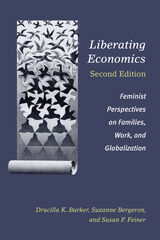
With all new and updated chapters, the second edition of Liberating Economics examines recent trends in inequality, global indebtedness, crises of care, labor precarity, and climate change. Taking an interdisciplinary and intersectional feminist approach, the new edition places even more emphasis on the ways that gender, race, class, sexuality, and nationality shape the economy. It also highlights the centrality of social reproduction in economic systems and makes connections between the economic circumstances of women in global North and global South. Throughout, the authors reject the idea that there is no alternative to our current neoliberal market economy and offer alternative ways of thinking about and organizing economic systems in order to achieve gender-equitable outcomes.
Written in an accessible and engaging style, this book will be of interest to students and scholars across a range of fields, policymakers, and any reader interested in creating just futures.



In Taiwan, small-scale subcontracting factories of thirty employees or less make items for export, like the wooden jewelry boxes that Ping-Chun Hsiung made when she worked in six such factories. These factories are found in rice fields and urban areas, front yards and living rooms, mostly employing married women in line with the government slogan that promotes work in the home—"Living Rooms as Factories."
Hsiung studies the experiences of the married women who work in this satellite system of factories, and how their work and family lives have contributed to Taiwan's 9.1 percent GNP growth over the last three decades, the "economic miracle." This vivid portrayal of the dual lives of these women as wives, mothers, daughters-in-law and as manufacturing workers also provides sophisticated analyses of the links between class and gender stratification, family dynamics, state policy, and global restructuring within the process of industrialization.
Hsiung uses ethnographic data to illustrate how, in this system of intersecting capitalist logic and patriarchal practices, some Taiwanese women experience upward mobility by marrying into the owners' family, while others remain home and wage workers. Although women in both groups acknowledge gender inequality, this commonality does not bridge divergent class affiliations. Along with a detailed account of the oppressive labor practices, this book reveals how workers employ clandestine tactics to defy the owners' claims on their labor.

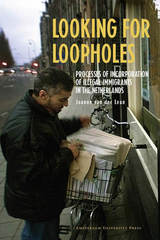

Listen to a short interview with Risa GoluboffHost: Chris Gondek | Producer: Heron & Crane
In this groundbreaking book, Risa L. Goluboff offers a provocative new account of the history of American civil rights law. The Supreme Court's decision in Brown v. Board of Education has long dominated that history. Since 1954, generations of judges, lawyers, and ordinary people have viewed civil rights as a project of breaking down formal legal barriers to integration, especially in the context of public education. Goluboff recovers a world before Brown, a world in which civil rights was legally, conceptually, and constitutionally up for grabs. Then, the petitions of black agricultural workers in the American South and industrial workers across the nation called for a civil rights law that would redress economic as well as legal inequalities. Lawyers in the new Civil Rights Section of the Department of Justice and in the NAACP took the workers' cases and viewed them as crucial to attacking Jim Crow. By the time NAACP lawyers set out on the path to Brown, however, they had eliminated workers' economic concerns from their litigation agenda. When the lawyers succeeded in Brown, they simultaneously marginalized the host of other harms--economic inequality chief among them--that afflicted the majority of African Americans during the mid-twentieth century. By uncovering the lost challenges workers and their lawyers launched against Jim Crow in the 1940s, Goluboff shows how Brown only partially fulfilled the promise of civil rights.
READERS
Browse our collection.
PUBLISHERS
See BiblioVault's publisher services.
STUDENT SERVICES
Files for college accessibility offices.
UChicago Accessibility Resources
home | accessibility | search | about | contact us
BiblioVault ® 2001 - 2024
The University of Chicago Press









